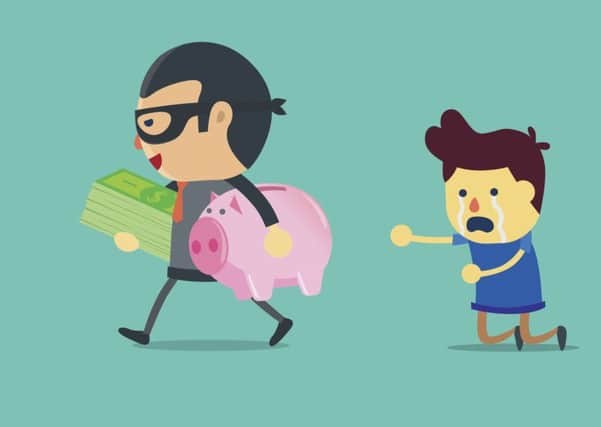Don't bank on getting your money back if you fall victim to fraud


RBS chief executive Ross McEwan was recently reported as cautioning that victims of bank fraud shouldn’t expect automatic refunds, highlighting the duty of care consumers have over their own actions.
So, generally, when might you get your money back, and when could your cash disappear for ever?
Payment safety nets
Advertisement
Hide AdAdvertisement
Hide AdPeople’s rights vary depending on how they lost money. Consumer group Which? says people accidentally paying a scammer using their credit card have protections under the Consumer Credit Act, which allows them to get their money back for transactions between £100 and £30,000.
With debit cards, you may be able to get your money back through the voluntary chargeback scheme with your bank.
If a payment is made to a scammer through an authorised direct debit payment, you’re covered by the Direct Debit Guarantee, meaning you could potentially have the payment reversed.
Check before you click
When it comes to bank transfers, there’s a difference between unauthorised and authorised transfers. With the latter, it could be more difficult to get your money back, as the bank has transferred the money on the customer’s instructions. This makes it vital to check before you click the payment button.
Authorised transfer fraud happens when someone is tricked into moving money from their own bank account directly into that of a fraudster.
By contrast, with unauthorised transfers, the fraudster accesses someone’s account without their knowledge and transfers money. In these cases, the bank is generally required to reimburse its customer.
Katy Worobec, head of fraud and financial crime prevention, cyber and data sharing at trade association UK Finance, says: “Banks are legally obliged to fulfil a customer’s request to transfer money within one working day even if they have warned the customer they are at risk of a potential scam.
“Customers rightly expect banks to carry out transactions they have authorised and in such cases banks will provide compensation on a case-by-case basis. Where a customer has not authorised a transaction, they will normally receive a refund.”
Advertisement
Hide AdAdvertisement
Hide AdWhich? says financial firms could do more to shoulder the burden when people are tricked into transferring cash to a fraudster. It made a super-complaint to financial regulators about the issue last year.
Gareth Shaw, Which? money expert, says: “Banks are still placing too much responsibility on consumers to spot and protect themselves from sophisticated online scams.”
What if you can’t agree with your financial firm?
Which? suggests that if your bank is disputing you’ve been a victim of fraud, you can ask for your claim to be escalated through its internal complaints process. If your bank has made up its mind, you could ask to be issued with a final letter of deadlock and then refer your claim to the Financial Ombudsman Service which resolves disputes between consumers and financial firms. Which? has a template letter of deadlock request at tiny.cc/WhichLetterDeadlock.